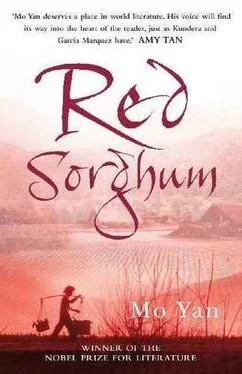When the wall produced a hollow sound, Granddad smashed a hole in it with the butt of his pistol, then reached in and pulled out a red cloth packet. He shook it. It jingled. He poured its contents out onto the kang — fifty silver dollars.
Pocketing the silver dollars, he said, ‘Let’s go, son.’
‘Go where, Dad?’
‘Into town to buy bullets. It’s time to settle scores with Pocky Leng.’
The sun had nearly set when they reached the northern outskirts of the city. Snaking darkly through the sorghum fields, a black locomotive chugged along the tracks of the Jiao-Ping — Jinan railway line, belching puffs of dark smoke above the sorghum tips. Sunlight reflecting off the tracks nearly blinded them. The loud shriek of the whistle terrified Father, who squeezed Granddad’s hand.
Granddad led Father to a large grave mound, in front of which stood a white tombstone twice as tall as a man. The chiselled words had been rubbed so smooth they were barely discernible, and the area was surrounded by trees so thick it would have taken at least two people to wrap their arms around any one of them. The black canopy of leaves rustled even when there was no wind, and the grave itself was walled off, like a black island, by stalks of blood-red sorghum.
Granddad dug a little hole in front of the tombstone and tossed his pistol in. Father also threw his Browning in the hole.
After crossing the tracks, they looked up at the high gateway in the city wall, over which flew a Japanese flag, its rising sun and spokelike rays catching the red rays of the setting sun. Sentries stood on both sides of the gate, a Japanese to the left and a Chinese to the right. While the Chinese soldier questioned and searched locals entering town, his Japanese counterpart stood watching, his rifle ready.
Now that they’d crossed the tracks, Granddad hoisted Father up onto his back and whispered, ‘Pretend you’ve got a bellyache. Groan a little.’
Father groaned. ‘Like that, Dad?’
‘Put a little more feeling into it.’
They fell into a line of people heading into the city. ‘What village are you from?’ the Chinese soldier asked haughtily. ‘What’s your business in town?’
‘Fish Beach, north of town,’ Granddad answered meekly. ‘My son has cholera. I’m taking him to see Dr Wu.’
Father was so wrapped up in the conversation between Granddad and the sentry he forgot to groan. But he screamed in pain when Granddad pinched him hard on the thigh.
The sentry waved them past.
‘You little bastard!’ Granddad cursed angrily when they were safely out of earshot. ‘Why didn’t you groan?’
‘That pinch hurt, Dad, it hurt a lot!’
Granddad led Father down a narrow cinder-paved street towards the train station. The sun’s rays were dying out; the air was foul. Father saw that two blockhouses had been built alongside the run-down train station. Two Japanese soldiers with leashed police dogs marched back and forth. Dozens of civilians squatted or stood beyond the railing waiting for a train, and a Chinese in a black uniform was positioned on the platform, red lantern in hand, as an eastbound train sounded its whistle. The ground shook, and the police dogs barked at the coming train. A little old woman hobbled back and forth in front of the waiting passengers, hawking cigarettes and melon seeds. The train chugged into the station and ground its wheels to a halt. There were, Father saw, more than twenty cars behind the locomotive — ten boxcars, followed by ten or more flatcars filled with cargo covered carelessly by green tarpaulins. Japs standing on the train called out to their comrades on the platform.
Father heard a sudden crack of gunfire from the sorghum field north of the tracks and saw a tall Jap soldier on one of the flatcars sway momentarily, then tumble headlong to the ground. The howl of a wolf sounded from one of the blockhouses, and the people, those disembarking and those waiting to board the train, scattered. The police dogs barked furiously; the machine guns on top of the blockhouses began spraying the area to the north. The train started up amid the confusion, belching puffs of black smoke and sending a shower of ashes onto the platform.
Granddad grabbed Father’s hand and dragged him quickly down a dark lane. He pushed open a half-closed gate and walked into a tiny courtyard, where a small red paper lantern hung from the eave of the house. A woman stood in the doorway, her face so heavily powdered you couldn’t tell her age. She was grinning broadly through painted lips; her teeth glistened. Black hair was piled up on her head, and she wore a silk flower behind her ear.
‘My dear elder brother!’ she called out with affected sweetness. ‘Now that you’re a commander, you don’t give a second thought to your little sister.’ She threw her arms around Granddad’s neck like a little girl.
‘Don’t do that,’ he complained. ‘Not in front of my son. I can’t waste time with you today! Are you still playing games with Fifth Brother?’
The woman stormed over to the gate and shut it, then took down the lantern and walked inside. ‘Fifth Brother was caught and beaten by the garrison command,’ she said with a pout.
‘Isn’t Song Shun of the garrison command his sworn brother?’
‘Do you really think you can trust fair-weather friends like that? After what happened at Qingdao, I’ve been sitting on the razor’s edge.’
‘Fifth Brother would never give you away. He proved that when he was grilled by Nine Dreams Cao.’
‘What are you doing here? They say you fought some Japanese armoured troops.’
‘It was a fiasco! I’m going to murder that motherfucking Pocky Leng!’
‘Don’t mess with that slippery toad. He’s too much for you.’
Granddad took the silver dollars out of his pocket and tossed them down on the table. ‘I want five hundred red-jacketed bullets.’
‘Red-jacketed, blue-jacketed, I got rid of them all when Fifth Brother was arrested. I can’t make bullets out of thin air.’
‘Don’t give me that! Here’s fifty dollars. Tell me, have I, Yu Zhan’ao, ever treated you wrong?’
‘My dear elder brother,’ the woman said, ‘what kind of talk is that? Don’t treat your little sister like a stranger.’
‘Then don’t get me mad!’ threatened Granddad.
‘You’ll never get out of town.’
‘That’s my problem, not yours. I want five hundred large cartridges and fifty small ones.’
The woman walked out into the yard to see if anyone was around, then returned to the house, opened a secret door in the wall, and took out a box of shells that shone like gold.
Granddad picked up a sack and stuffed bullets inside, then tied it around his waist. ‘Let’s go!’ he said.
The woman stopped him. ‘How do you plan to get away?’
‘By crawling across the tracks near the train station.’
‘No good,’ she said. ‘There are blockhouses there, with searchlights, dogs, and guards.’
‘We’ll give it a try,’ Granddad said mockingly. ‘If it doesn’t work, we’ll be back.’
Granddad and Father made their way down the dark lane towards the train station and hid alongside the wall of a blacksmith shop; from here they had a clear view of the brightly lit platform and the sentries standing on it. Granddad led Father to the western end of the station, where there was a freight yard. A barbed-wire fence ran from the station all the way to the city wall, and searchlights on top of the blockhouses swept the area, illuminating a dozen or more sets of tracks.
They crawled up next to the barbed-wire fence and tugged on it, hoping to open a hole big enough to crawl through. But it was too taut, and one of the barbs punctured the palm of Father’s hand. He whimpered.
Читать дальше












